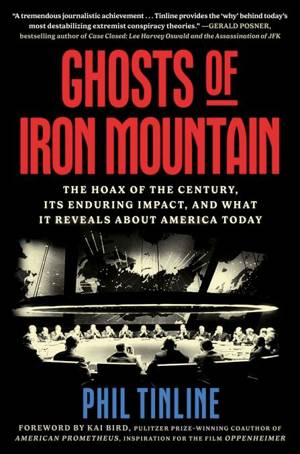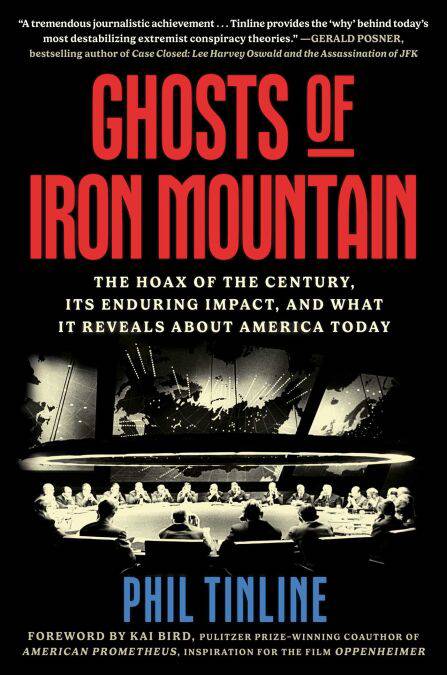
- Retrait gratuit dans votre magasin Club
- 7.000.000 titres dans notre catalogue
- Payer en toute sécurité
- Toujours un magasin près de chez vous
- Retrait gratuit dans votre magasin Club
- 7.000.0000 titres dans notre catalogue
- Payer en toute sécurité
- Toujours un magasin près de chez vous
Ghosts of Iron Mountain EBOOK
The Hoax of the Century, Its Enduring Impact, and What It Reveals About America Today
Phil Tinline
Ebook | Anglais
16,76 €
+ 16 points
Format
Description
“Spellbinding.” —Rick Perlstein * “A clever, fast-paced read of dazzling originality.” —William I. Hitchcock
“An excellent new book, both important and unsettling” (The New York Times), Ghosts of Iron Mountain unravels the astounding origins and far-reaching impacts of a monumental late 1960s hoax, perpetrated by cultural icons including Victor Navasky and E.L. Doctorow—a must-read for anyone curious about the surprising connections between John F. Kennedy, Oliver Stone, Timothy McVeigh, Alex Jones, and Donald Trump.
Explore the intricate web of America’s conspiracy culture with this investigative masterpiece that unearths the roots of our era’s most potent myths.
In 1966, amid unrest over the Vietnam War and the alarming growth of the military-industrial complex, little-known writer Leonard Lewin was approached by a group of ingenious satirists on the Left to concoct a document that would pretend to ratify everyone’s fears that the government was deceiving the public. Devoting more than a year to the project, Lewin constructed a fiction (passed off as the honest truth) that a government-run Study Group had been charged with examining the “cost of peace,” setting its first meetings in the very real Iron Mountain nuclear bunker in upstate New York (which lent the resulting book, Report from Iron Mountain, its name). In Lewin’s telling, this gathering of the nation’s academic elite concluded that suspending war would be disastrous, forcing all sorts of bizarre measures to compensate.
Lewin didn’t realize it at the time, but he’d created a narrative that fed the interests of both ends of the political spectrum—by promoting the idea that the government uses centralized power for evil.
What fascinates about Phil Tinline’s revelation-filled recreation of that ingenious hoax is seeing how it explodes into America’s consciousness, dominates media reports, and sends government officials scrambling. And then, how Lewin’s fabrication is adopted by a seemingly endless string of extremist organizations which view it as supporting their ideology.
In this riveting—and, at times, chilling—tale is an unsettling warning about how, in contemporary times, a deception may no longer be considered a hoax if it can be used to recruit followers to a cause.
“An excellent new book, both important and unsettling” (The New York Times), Ghosts of Iron Mountain unravels the astounding origins and far-reaching impacts of a monumental late 1960s hoax, perpetrated by cultural icons including Victor Navasky and E.L. Doctorow—a must-read for anyone curious about the surprising connections between John F. Kennedy, Oliver Stone, Timothy McVeigh, Alex Jones, and Donald Trump.
Explore the intricate web of America’s conspiracy culture with this investigative masterpiece that unearths the roots of our era’s most potent myths.
In 1966, amid unrest over the Vietnam War and the alarming growth of the military-industrial complex, little-known writer Leonard Lewin was approached by a group of ingenious satirists on the Left to concoct a document that would pretend to ratify everyone’s fears that the government was deceiving the public. Devoting more than a year to the project, Lewin constructed a fiction (passed off as the honest truth) that a government-run Study Group had been charged with examining the “cost of peace,” setting its first meetings in the very real Iron Mountain nuclear bunker in upstate New York (which lent the resulting book, Report from Iron Mountain, its name). In Lewin’s telling, this gathering of the nation’s academic elite concluded that suspending war would be disastrous, forcing all sorts of bizarre measures to compensate.
Lewin didn’t realize it at the time, but he’d created a narrative that fed the interests of both ends of the political spectrum—by promoting the idea that the government uses centralized power for evil.
What fascinates about Phil Tinline’s revelation-filled recreation of that ingenious hoax is seeing how it explodes into America’s consciousness, dominates media reports, and sends government officials scrambling. And then, how Lewin’s fabrication is adopted by a seemingly endless string of extremist organizations which view it as supporting their ideology.
In this riveting—and, at times, chilling—tale is an unsettling warning about how, in contemporary times, a deception may no longer be considered a hoax if it can be used to recruit followers to a cause.
Spécifications
Parties prenantes
- Auteur(s) :
- Editeur:
Contenu
- Nombre de pages :
- 352
- Langue:
- Anglais
Caractéristiques
- EAN:
- 9781668050514
- Date de parution :
- 24-03-25
- Format:
- Ebook
- Protection digitale:
- Adobe DRM
- Format numérique:
- ePub

Les avis
Nous publions uniquement les avis qui respectent les conditions requises. Consultez nos conditions pour les avis.






